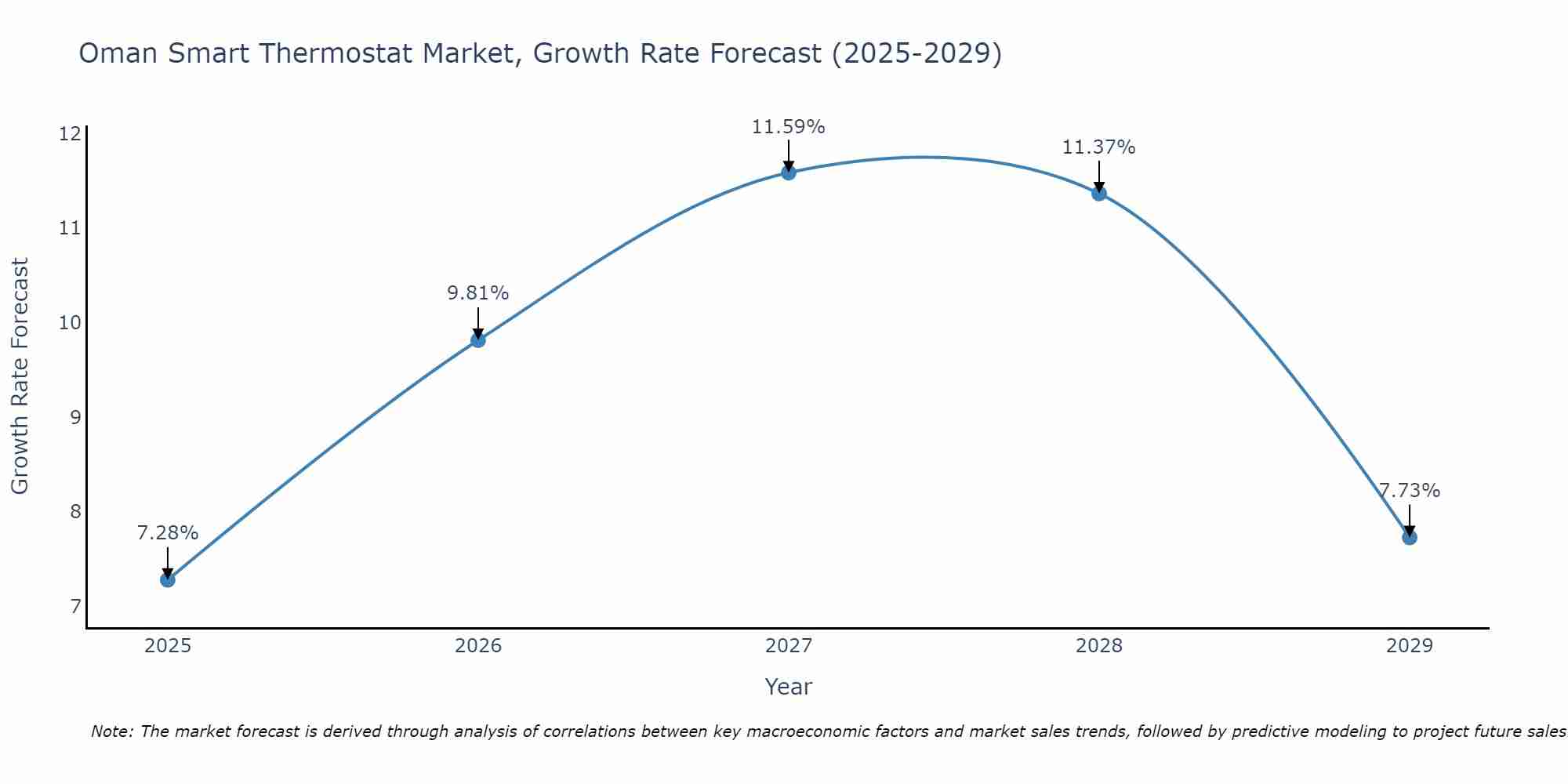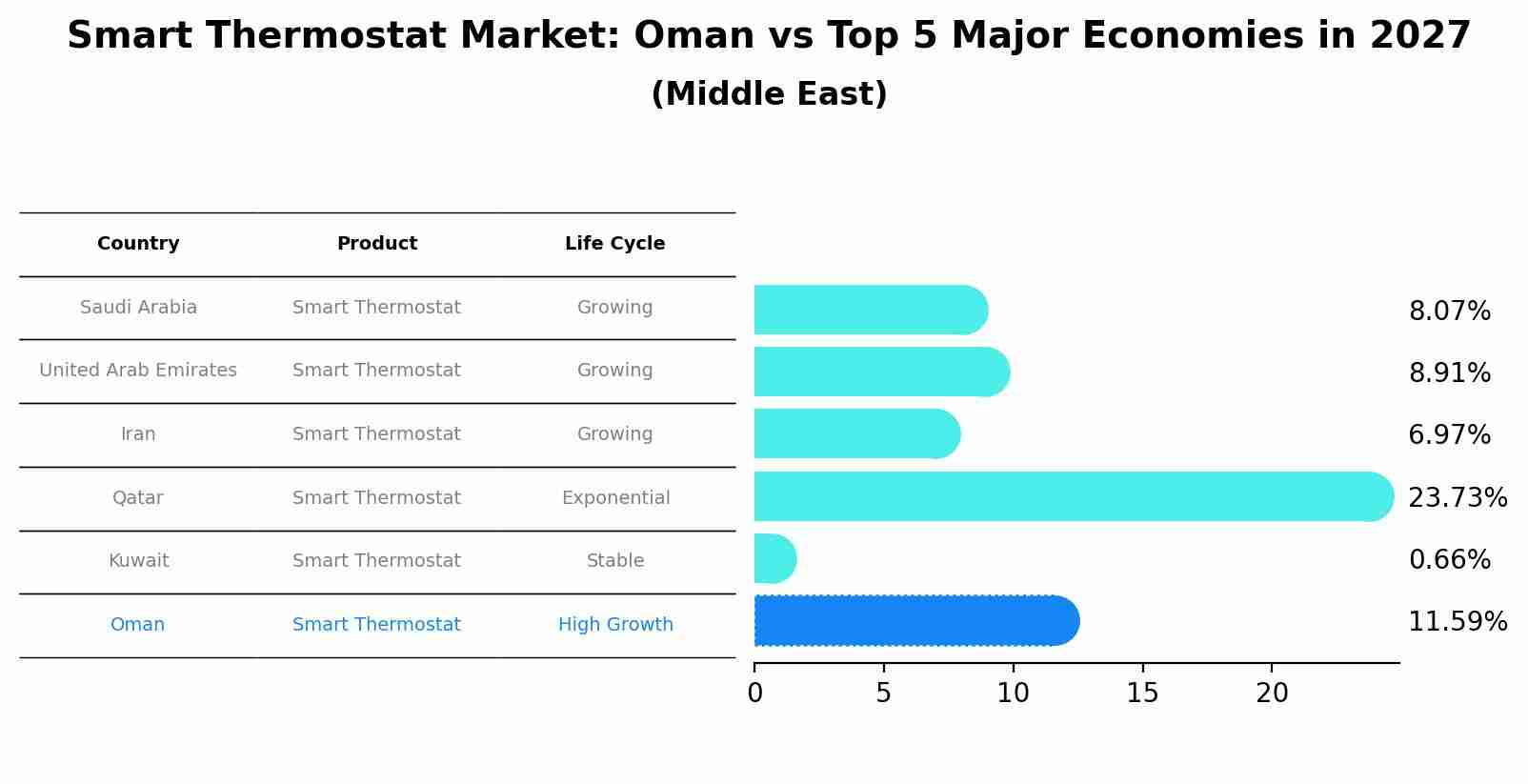Oman Smart Thermostat Market Outlook | Share, Revenue, Trends, Value, Companies, COVID-19 IMPACT, Analysis, Industry, Forecast, Growth & Size
| Product Code: ETC369523 | Publication Date: Aug 2022 | Updated Date: Jul 2025 | Product Type: Market Research Report | |
| Publisher: 6Wresearch | Author: Ravi Bhandari | No. of Pages: 75 | No. of Figures: 35 | No. of Tables: 20 |
Oman Smart Thermostat Market Size Growth Rate
The Oman Smart Thermostat Market is projected to witness mixed growth rate patterns during 2025 to 2029. Starting at 7.28% in 2025, the market peaks at 11.59% in 2027, and settles at 7.73% by 2029.

Smart Thermostat Market: Oman vs Top 5 Major Economies in 2027 (Middle East)
In the Middle East region, the Smart Thermostat market in Oman is projected to expand at a high growth rate of 11.59% by 2027. The largest economy is Saudi Arabia, followed by United Arab Emirates, Iran, Qatar and Kuwait.

Oman Smart Thermostat Market Synopsis
The Oman Smart Thermostat Market is witnessing steady growth driven by the increasing awareness of energy efficiency and the rising adoption of smart home technology in the country. The demand for smart thermostats is driven by the need for more convenient and cost-effective ways to control heating and cooling systems in homes and commercial buildings. Key players in the market are focusing on product innovation, such as the integration of AI and machine learning technologies, to enhance the efficiency and usability of smart thermostats. Additionally, government initiatives promoting energy conservation and sustainable living are fueling the market growth. The market is expected to continue expanding as consumers seek ways to reduce energy consumption and lower their carbon footprint.
Oman Smart Thermostat Market Trends
The Oman Smart Thermostat Market is witnessing a growing demand for energy-efficient solutions driven by increasing awareness about the benefits of smart technology in conserving energy and reducing electricity bills. Consumers in Oman are increasingly adopting smart thermostats for their ability to regulate home temperatures remotely and optimize energy consumption. The market is also experiencing a trend towards integration with smart home ecosystems and voice-controlled assistants, enhancing the overall user experience. With the government`s push towards sustainable development and energy efficiency, the Oman Smart Thermostat Market is expected to continue its growth trajectory, with a focus on innovative features such as learning algorithms and predictive analytics to further enhance energy savings and comfort levels for consumers.
Oman Smart Thermostat Market Challenges
In the Oman Smart Thermostat Market, several challenges are faced that hinder its growth and adoption. One major challenge is the limited awareness and understanding of smart thermostat technology among consumers in Oman. Many households are not familiar with the benefits of smart thermostats, such as energy savings and enhanced comfort. Additionally, the high initial cost of purchasing and installing smart thermostats acts as a barrier for many potential customers. Furthermore, the lack of compatibility with existing heating, ventilation, and air conditioning (HVAC) systems in some Omani homes poses a challenge for the widespread adoption of smart thermostats. Addressing these challenges through targeted marketing campaigns, education initiatives, and offering incentives for adoption could help drive the growth of the Smart Thermostat Market in Oman.
Oman Smart Thermostat Market Investment Opportunities
The Oman Smart Thermostat Market presents promising investment opportunities due to the increasing emphasis on energy efficiency and the adoption of smart home technologies in the country. With the government`s initiatives to promote sustainable practices and the rising awareness among consumers regarding energy conservation, the demand for smart thermostats is expected to grow. Investors can explore opportunities in partnering with local distributors or retailers to introduce innovative and energy-efficient smart thermostat products to the Omani market. Additionally, collaborations with property developers or HVAC companies for integrating smart thermostats into new construction projects or existing buildings can also be lucrative. Overall, the Oman Smart Thermostat Market offers a favorable landscape for investments in smart home technology solutions catering to the growing demand for energy-efficient products in the country.
Jordan Agar Market Government Policies
The government of Oman has been actively promoting energy efficiency and sustainability in the country, which has led to the implementation of various policies supporting the adoption of smart thermostats. These policies include incentives for households and businesses to invest in smart thermostat technology through subsidies and rebates. Additionally, the government has introduced regulations mandating the use of energy-efficient devices in new construction projects and retrofitting existing buildings. This regulatory environment has created a favorable market for smart thermostat manufacturers and suppliers in Oman, driving the growth of the smart thermostat market in the country. Overall, government policies in Oman are focused on reducing energy consumption, lowering carbon emissions, and promoting the use of smart technologies like thermostats to achieve these goals.
Oman Smart Thermostat Market Future Outlook
The Oman Smart Thermostat Market is poised for significant growth in the coming years, driven by increasing awareness of energy efficiency and the growing trend of smart home automation. The market is expected to experience a surge in demand as consumers seek ways to reduce energy consumption and lower utility costs. Additionally, government initiatives promoting sustainable living and the adoption of smart technologies are likely to further propel market growth. The increasing availability of advanced features such as remote access, voice control, and integration with smart home ecosystems will also contribute to the market expansion. Overall, the Oman Smart Thermostat Market is forecasted to witness substantial growth opportunities as the country embraces smart technologies and aims for a more sustainable future.
Key Highlights of the Report:
- Oman Smart Thermostat Market Outlook
- Market Size of Oman Smart Thermostat Market, 2021
- Forecast of Oman Smart Thermostat Market, 2031
- Historical Data and Forecast of Oman Smart Thermostat Revenues & Volume for the Period 2018 - 2031
- Oman Smart Thermostat Market Trend Evolution
- Oman Smart Thermostat Market Drivers and Challenges
- Oman Smart Thermostat Price Trends
- Oman Smart Thermostat Porter's Five Forces
- Oman Smart Thermostat Industry Life Cycle
- Historical Data and Forecast of Oman Smart Thermostat Market Revenues & Volume By Type for the Period 2018 - 2031
- Historical Data and Forecast of Oman Smart Thermostat Market Revenues & Volume By Wireless for the Period 2018 - 2031
- Historical Data and Forecast of Oman Smart Thermostat Market Revenues & Volume By Wireless for the Period 2018 - 2031
- Historical Data and Forecast of Oman Smart Thermostat Market Revenues & Volume By End-User Vertical for the Period 2018 - 2031
- Historical Data and Forecast of Oman Smart Thermostat Market Revenues & Volume By Residential for the Period 2018 - 2031
- Historical Data and Forecast of Oman Smart Thermostat Market Revenues & Volume By Commercial for the Period 2018 - 2031
- Oman Smart Thermostat Import Export Trade Statistics
- Market Opportunity Assessment By Type
- Market Opportunity Assessment By End-User Vertical
- Oman Smart Thermostat Top Companies Market Share
- Oman Smart Thermostat Competitive Benchmarking By Technical and Operational Parameters
- Oman Smart Thermostat Company Profiles
- Oman Smart Thermostat Key Strategic Recommendations
Frequently Asked Questions About the Market Study (FAQs):
- Single User License$ 1,995
- Department License$ 2,400
- Site License$ 3,120
- Global License$ 3,795
Search
Thought Leadership and Analyst Meet
Our Clients
Related Reports
- Canada Oil and Gas Market (2026-2032) | Share, Segmentation, Value, Industry, Trends, Forecast, Analysis, Size & Revenue, Growth, Competitive Landscape, Outlook, Companies
- Germany Breakfast Food Market (2026-2032) | Industry, Share, Growth, Size, Companies, Value, Analysis, Revenue, Trends, Forecast & Outlook
- Australia Briquette Market (2025-2031) | Growth, Size, Revenue, Forecast, Analysis, Trends, Value, Share, Industry & Companies
- Vietnam System Integrator Market (2025-2031) | Size, Companies, Analysis, Industry, Value, Forecast, Growth, Trends, Revenue & Share
- ASEAN and Thailand Brain Health Supplements Market (2025-2031) | Strategy, Consumer Insights, Analysis, Investment Trends, Opportunities, Growth, Size, Share, Industry, Revenue, Segments, Value, Segmentation, Supply, Forecast, Restraints, Outlook, Competition, Drivers, Trends, Demand, Pricing Analysis, Competitive, Strategic Insights, Companies, Challenges
- ASEAN Bearings Market (2025-2031) | Strategy, Consumer Insights, Analysis, Investment Trends, Opportunities, Growth, Size, Share, Industry, Revenue, Segments, Value, Segmentation, Supply, Forecast, Restraints, Outlook, Competition, Drivers, Trends, Demand, Pricing Analysis, Competitive, Strategic Insights, Companies, Challenges
- Europe Flooring Market (2025-2031) | Outlook, Share, Industry, Trends, Forecast, Companies, Revenue, Size, Analysis, Growth & Value
- Saudi Arabia Manlift Market (2025-2031) | Outlook, Size, Growth, Trends, Companies, Industry, Revenue, Value, Share, Forecast & Analysis
- Uganda Excavator, Crane, and Wheel Loaders Market (2025-2031) | Strategy, Consumer Insights, Analysis, Investment Trends, Opportunities, Growth, Size, Share, Industry, Revenue, Segments, Value, Segmentation, Supply, Forecast, Restraints, Outlook, Competition, Drivers, Trends, Demand, Pricing Analysis, Competitive, Strategic Insights, Companies, Challenges
- Rwanda Excavator, Crane, and Wheel Loaders Market (2025-2031) | Strategy, Consumer Insights, Analysis, Investment Trends, Opportunities, Growth, Size, Share, Industry, Revenue, Segments, Value, Segmentation, Supply, Forecast, Restraints, Outlook, Competition, Drivers, Trends, Demand, Pricing Analysis, Competitive, Strategic Insights, Companies, Challenges
Industry Events and Analyst Meet
Whitepaper
- Middle East & Africa Commercial Security Market Click here to view more.
- Middle East & Africa Fire Safety Systems & Equipment Market Click here to view more.
- GCC Drone Market Click here to view more.
- Middle East Lighting Fixture Market Click here to view more.
- GCC Physical & Perimeter Security Market Click here to view more.
6WResearch In News
- Doha a strategic location for EV manufacturing hub: IPA Qatar
- Demand for luxury TVs surging in the GCC, says Samsung
- Empowering Growth: The Thriving Journey of Bangladesh’s Cable Industry
- Demand for luxury TVs surging in the GCC, says Samsung
- Video call with a traditional healer? Once unthinkable, it’s now common in South Africa
- Intelligent Buildings To Smooth GCC’s Path To Net Zero


















